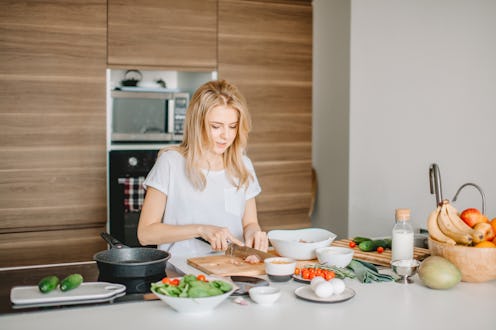
If you keep your finger on the pulse of health and wellness trends, you've probably heard the word about bodily inflammation and how it's not so great for you. But there are ways to reduce inflammation that are pretty easy to work into your normal routine. And like most things, it's all about considering your body and mind as a whole package.
As Kristin Koskinen, RDN, LD, CD tells Bustle, inflammation is the body’s natural response to injury or infection and in certain situations, is a necessary part of the healing process.
"However, when inflammation becomes chronic, it can be the source of diseases often related to aging, including diabetes, heart disease, arthritis, cancer, and Alzheimer’s disease," she says. The tell-tale signs of inflammation are redness, swelling, heat, and pain.
But it's not just about physical stress or injury. Inflammation in the body is also caused by emotional stress, nutritional issues, and sleep problems, as Nikolai Blinow, coach & licensed mental health counselor, tells Bustle.
"Inflammation can trigger anything from autoimmune disorders to skin issues to depression," Blinow says. Basically anything that compromises your immune system can cause inflammation.
If you feel as though you're dealing with any kind of stressor or think inflammation might be an issue for you, take a peek at the tips below that the pros swear reduce your levels of inflammation.
1Practice Sleep Hygiene
Easier said than done. Sleep is another simple way that people can combat inflammation, says Blinow.
"Most people aren't aware that sleep plays a vital role in allowing our body time to repair itself," she says. "When we are sleep deprived, or our sleep quality is poor, our body doesn't get the time it needs to do adequate repair, and inflammation can be the result."
Trying to keep a consistent bedtime, creating an optimal dark and quiet sleep environment, and making sure to get 7-9 hours are all great habits.
2Go Easy On The Alcohol
While there's nothing wrong the occasional drink, drinking too much alcohol, and really eating anything that breaks down into a lot of sugar, causes inflammation, says Blinow.
Taking a few nights off from cocktails or keeping well-hydrated as you imbibe is a way to battle the inflammation alcohol can cause.
3Replace Processed Foods With Fresh Produce
Sometimes it's not fun to put down the pretzels and choose apple slices. And by no means do you have to cut out all your favorite snacks, because we all need our treats. But be aware that there are foods that cause more inflammation than others.
"When it comes to nutrition, inflammation is often caused by being undernourished and choosing foods that leave your body nutrient-deficient," says Blinow.
To reduce inflammation, Blinow says that a diet rich in vegetable and plant matter is recommended, as well as drinking plenty of water.
Some people also experience dietary sensitivities to things like gluten or dairy, and these can also trigger inflammation.
4Do Things That Make You Feel Calm
Ugh, stress. More than just being annoying, and you know, stressful, it compromises your immune system because it triggers our flight-or-flight response, says Blinow.
Ask yourself what kinds of activities help you to feel less stressed, and do those things habitually! Maybe it's meditation, getting a massage, or simply taking long walks.
5Take Care Of Your Mental And Emotional Health
Taking care of your emotional and mental health on a deeper level is important, too.
"In the long-term, inflammation caused by emotional stress is actually harmful to the body," Blinow says.
So pay attention to your emotions and levels of anxiety, depression, or stress from day to day. Reach out for help from a professional if you feel you are in need of some
6Use High Quality Olive Oil When You Cook
Nothing too hard about adding a little more delicious and nutritious olive oil, my friends. Nutritionist Lisa Richards tells Bustle this is a great and simple way to battle inflammation.
“Choosing the right oil for cooking and salad dressings can lower inflammation in your gut," Richards says.
"A good example is high-quality olive oil, which contains omega-3 fatty acids that prevent the formation of pro-inflammatory compounds," she says. "Those omega-3 fatty acids also balance out the omega-6s in the rest of your diet."
7Incorporate Probiotics
Probiotics are so hot right now, you know? But for a good reason,
Dr. Raphael Kellman, the founder of The Kellman Center for Integrative and Functional Medicine tells Bustle they can definitely help inflammation.
“Treat your microbiome," says Dr. Kellman. "A diverse microbiome and a healthy gut will help you reduce inflammation."
The inflammation from food reactions can imbalance your gut, meaning that food isn’t being broken down sufficiently, he says. It then lingers too long in the intestines before being digested and expelled.
"A healthy microbiome has a deep positive effect on reducing inflammation and thereby preventing disease," he says. "Speak with your doctor or a specialist to figure out what probiotics are best for you and your individual needs.”
8Add Turmeric To Your Diet
Jessica Rosen, certified holistic health coach & co-founder of Raw Generation tells Bustle that turmeric is the most effective anti-inflammatory food. She simply swears by its "amazing medicinal properties and antioxidant effects."
"Turmeric has a stronger efficacy when it comes to relieving painful symptoms of inflammation than common over-the-counter medicines," she says. Some other anti-inflammatory benefits of this potent spice?
"It fights acne and gives you glowing skin, improves digestion, [...] and helps cures coughs and colds!" says Rosen.
Not only do these habits reduce inflammation, they can help the body and mind overall, as well. Nothing wrong with that, you know?